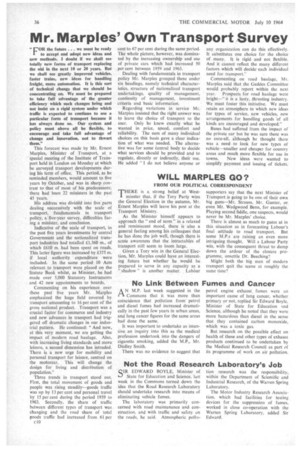Mr. Marples' Own Transport Survey
Page 38

If you've noticed an error in this article please click here to report it so we can fix it.
" roR the future ... we must be ready
I to accept and adopt new ideas and new methods. 1 doubt if we shall see totally new forms of transport replacing the old in the next 10 or 20 years. But we shall see greatly improved vehicles, faster trains, new ideas for handling freight, more automation. It is this sort of technical change that we should be concentrating on. We must be prepared to take full advantage of the greater efficiency which such changes bring and not insist on a rigid system under which traffic is expected to continue to use a particular form of transport because it has always done so. Our system and policy must above all be flexible, to encourage and take full advantage of change and innovation, not to thwart them."
This forecast was made by Mr. Ernest Marples, Minister of Transport, at a -special meeting of the Institute of Transport held in London on Monday at which he surveyed transport developments during his term of office. This period, as be reminded members, would amount to five years by October, and was in sharp contrast to that of most of his predecessors; there had been 22 ministers in the past 45 years.
His address was divided into five parts dealing successively with the scale of transport, fundamentals in transport policy, a 'five-year survey, difficulties facing a minister, and conclusion.
Indicative of the scale of transport, in the past five years investments by central Government and the nationalized transport industries had totalled £1,360 m., of which £610 m. had been spent on roads. This latter figure was increased by £375 m. if local authority expenditure were included. In the same period 10 Acts relevant to transport were placed on the Statute Book whilst, as Minister, he had made over 5.000 Statutory Instruments and 42 new appointments to boards.
Commenting on his experience over these past five years Mr. Marples emphasized the huge field covered by transport amounting to 16 per cent of the gross national product. Transport was a crucial factor for commerce and industry and new advances in transport had triggered off dramatic changes in our industrial pattern. He continued: "And now, at this very moment, we are getting the impact of modern road haulage. Also. with increasing living standards and more leisure, a second dimension has intruded. There is a new urge for mobility and personal transport for leisure, centred on the motorcar. This will change the design for living and distribution of population."
Three trends in transport stood out. First, the total movement of goods and people was rising steadily—goods traffic was up by 13 per cent and personal travel by 15 per cent during the period 1959 to 1963. Secondly, the share of traffic between different types of transport was changing and the road share of total goods traffic had increased from 61 per c i 0 cent to 67 per cent during the same period. The whole picture, however, was dominated by the increasing ownership and use of private cars which had increased 50 per cent between 1959 and 1963.
Dealing with fundamentals in transport policy Mr. Marples grouped these under six headings, namely technical characteristics, structure of nationalized transport undertakings, quality of management, continuity of management, investment criteria and basic information.
Regarding variations in service Mr. Marples insisted that the right answer was to leave the choice of transport to the user. Only he knew exactly what he wanted in price, speed, comfort and reliability. The sum of many individual choices on this basis gave a clear indication of what was needed. The alternative was for some Central body to decide what services should bc provided and to regulate, directly or indirectly, their use. He added "I do not believe anyone or any organization can do this effectively. It substitutes one choice for the choice of many. It is rigid and not flexible. And it cannot reflect the many different factors which will decide-each individual need for transport."
Commenting on road haulage, Mr. Marples said that. the Geddes Committee would probably report within the next year. Prospects for road haulage were bright—" it is a lusty, thrusting industry. We must foster this initiative. We must retain an atmosphere in 'which new ideas for types of service, new vehicles, new arrangements for handling goods 'of all kinds are encouraged and developed.
Buses had suffered from the impact of the private car hut he was sure there was no cure-all, although he thought there was a need to look for new types of vehicle--smaller and cheaper for country areas and much more flexible for use in towns. New ideas were wanted to simplify payment and issuing of tickets.
























































































































